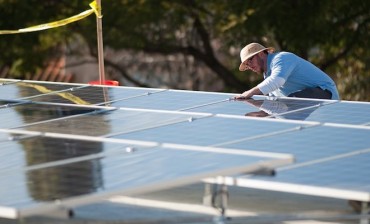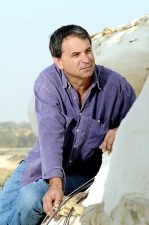 This machine cleans waste water and generates energy at the same time.
This machine cleans waste water and generates energy at the same time.
Researchers from Pennsylvania State University have developed technology that treats waste water and generates energy at the same time – two priorities for Middle Eastern municipalities. Combining Reverse Electrodialysis (RED) technology developed in the Netherlands and Norway, which harvests energy where fresh water and sea water meet, with Microbial Fuel Cells (MFC) that use organic matter to create an electric current, Professor Bruce Logan and his team have found the ultimate solution for developing countries that have limited access to water and power.
Where fresh water and salt water meet
RED technology involves placing fresh water and salt water in intermittent chambers of a fuel cell which are separated by membranes and then create an electrochemical charge, but Penn State researchers told the BBC that this technology has limitations.
First, it’s necessary for power plants to be situated alongside coastlines in order to make use of the salt water, and they require a great number of membranes to work.
But the MFCs aren’t ideal either. By using bacteria in waste water they can create an electric current and substitute ammonium bicarbonate solution for salt water such that they can be used anywhere, but they operate slowly and don’t produce a lot of power.
But used together, the separate technologies are much more viable.
Two is better than one
“In our process, we have the MFC part which is treating waste water and creating energy, and we have the RED stack which is just boosting that process, it’s making it happen more efficiently,” Logan told the BBC.
Although designed for use in developing countries, this technology could also be used in Gulf countries that have no shortage of either salt or waste water, but a frightening dearth of fresh water.
And though these states are oil producers, local governments are striving to curtail domestic energy supplies in order to prolong the life of this valuable export commodity.
The National recently reported that three universities in the United Arab Emirates have developed a Masters program devoted to finding solutions to water issues, but very few students are signing up – signaling both a lack of awareness and funding for serious problems that await all seven emirates in the coming decades.
We don’t usually promote imported solutions, but we’re running out of time. This latest development from Penn State is at least worth a look.
The details of Penn State’s waste water treatment system and energy generator first appeared in the journal Science.
:: BBC
More on water and energy issues in the Middle East:
Yemen Running Dry as Water Shortages Reaches Extreme Levels
Nuclear-Powered Water for the UAE?
What Abu Dhabi Plans for When the Water Runs Out



